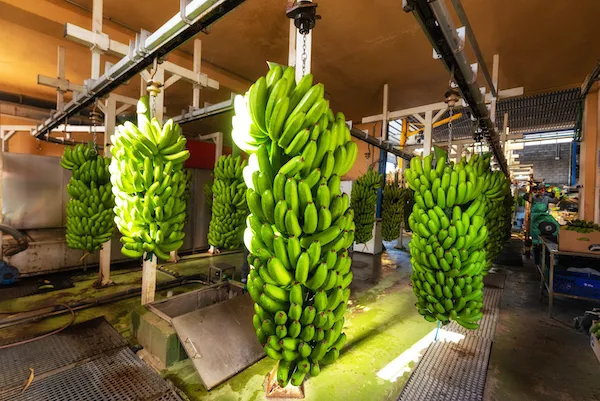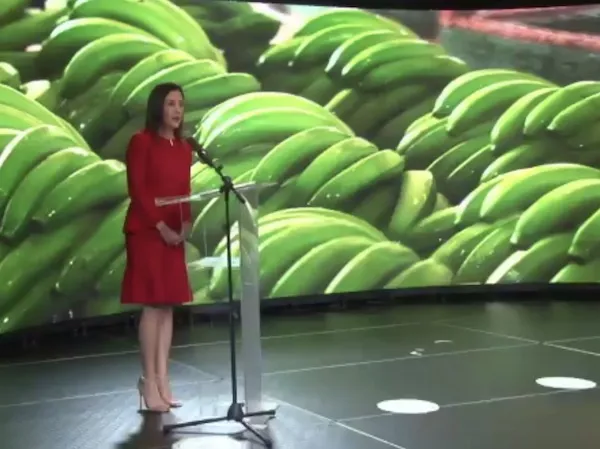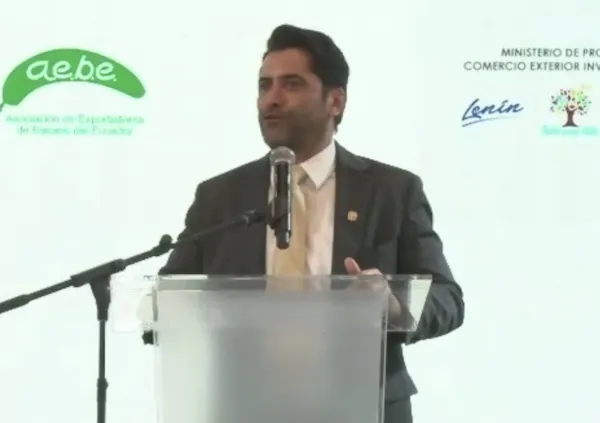Monday, October 5th, marked the start of the 17th annual International Banana Convention, which is held, like so many other annual industry events, virtually this year. Yesterday was the opening ceremony of the event, which was held in Guayaquil, Ecuador, and included multiple speakers – including Ecuador’s president, Lenín Moreno. This event is hosted by A.E.B.E., the Ecuadorian Association of Banana Exporters. The convention is run in conjunction with the International Congress on Biotechnology and Biodiversity.
Throughout this week, the convention will boast many educational sessions and webinars focusing on the challenges that have emerged due to the pandemic for the banana industry, as well as how biotechnology can be used to improve the sector. Another focus of some of the sessions will be the threat of TR4 and how the industry can best approach it.

Biotechnology’s potential to positively impact the industry
To start off the opening event, two speakers on biotechnology briefly explained the importance of biotechnology and its potential to transform the banana, as well as other agricultural sectors. Daynet Sosa del Castillo, Director of the Center for Biotechnical Research of Ecuador (CIBE) explained the importance of incorporating biotechnology into agriculture: “One example where biotechnology can be applied is TR4, which is of course a very important issue for the banana industry. This can be addressed through genetic editing and sequencing techniques. The most important focus now is for biotechnological research to find a way to move the research and findings from the lab into practice and apply it in the fields so that the true potential of the research can be realized,” she says.
 Paloma Moncaleán is the principal forestry researcher at NEIKE, a member of the Basque Research & Technology Alliance in Spain. She also spoke briefly on the importance of biotechnological research: “Especially in the socially uncertain times that we currently live in, it has become clear that scientific research is vitally important – it help us prepare for the future. Biotechnology will help increase agricultural efficiency and food safety, and help us all live more sustainably, protect our ecosystems, and ensure that the population continues to be properly fed. Biotechnology is able to offer answers to a number of the important questions we face today,” she says.
Paloma Moncaleán is the principal forestry researcher at NEIKE, a member of the Basque Research & Technology Alliance in Spain. She also spoke briefly on the importance of biotechnological research: “Especially in the socially uncertain times that we currently live in, it has become clear that scientific research is vitally important – it help us prepare for the future. Biotechnology will help increase agricultural efficiency and food safety, and help us all live more sustainably, protect our ecosystems, and ensure that the population continues to be properly fed. Biotechnology is able to offer answers to a number of the important questions we face today,” she says.
Right: Paloma Moncaleán.
Opening the convention: words from the government and A.E.B.E.
Next, the opening ceremony featured a number of important speakers who briefly discussed the state from the banana industry and their office’s efforts in progressing the industry’s output and market share. Ecuadorian President Moreno addressed the audience through a video, saying: “This event is important for consolidating relationships with our commercial partners and opening new markets. Partnerships are vital and nothing is better than strengthening those links in these critical times.”
“Ecuador exports 30% of the global banana supply, and we’ve been able to maintain this number even throughout the pandemic,” says Marianela Ubilla, President of the Board of A.E.B.E. “Our position in the global market is the result of our efforts, knowledge, and dedication. Our industry’s focus continues to be on product quality, traceability, sustainability, and social commitments.”

Marianela Ubilla, President of the Board of A.E.B.E.
There will also be an increased focus on new trade agreements, says Iván Ontaneda Berrú, who is Ecuador’s Minister of Production. “We want to become more pragmatic our trade agreements. On behalf of the national government, we are here to offer the support required to continue the success of Ecuador’s banana industry. We are looking toward countries with big market potential, such as Korea and China, to increase the opportunities of our growers. There is a lot to do, but a lot has already been achieved,” says Berrú.

Iván Ontaneda Berrú, Ecuador’s Minister of Production.
Charles-Michel Geurts, ambassador of the European Union in Ecuador, briefly discussed Europe’s new green deal and its possible effects on the industry: “While it will bring new challenges, it will also bring new opportunities for business and trade partners. There is 12.5-kilogram per capita consumption of bananas in the European Union which means that we have a lot of opportunities ahead of us, and with this new deal there will be more niche markets to continue to grow in,” he says.
Robert Cordova, Undersecretary to Ecuador’s Minister of Agriculture Xavier Lazo, says “We are facing a major challenge: What to do following the pandemic. What will we face?” Dr. Cecilia Paredes Verduga, Director of Escuela Politécnica del Litoral, adds: “We are here together on this occasion to offer solutions to Ecuador’s agriculture. Solutions that will allow us to reinvent ourselves with empathy and innovation. The focus here is biotechnology and post-covid recovery. We will discuss and establish new relationships, and even with the new challenges we will continue to innovate and explore the new opportunities and possibilities we face.”

The opening ceremony concluded with a ribbon cutting.
The International Banana Convention will run through Thursday, October 8th. To register to attend the event, click here. To see a schedule of the educational sessions, click here.
